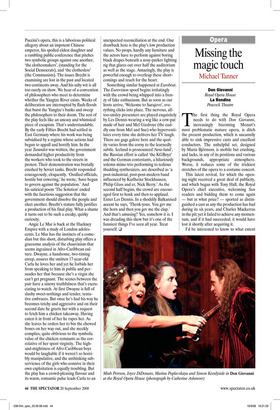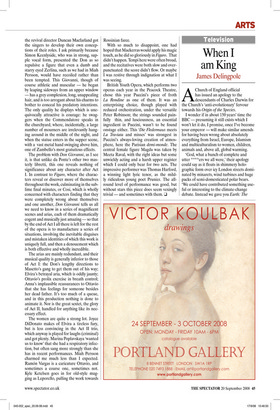Missing the magic touch
Michael Tanner
Don Giovanni Royal Opera House La Rondine Peacock Theatre
The first thing the Royal Opera needs to do with Don Giovanni, increasingly becoming Mozart’s most problematic mature opera, is ditch the present production, which is uncannily able to sink impressive casts and excellent conductors. The unhelpful set, designed by Maria Björnson, is mobile but crushing, and lacks, in any of its positions and various backgrounds, appropriate atmosphere. Worse, it reduces some of the trickiest stretches of the opera to a costume concert.
This latest revival, for which the opening night received a great deal of publicity, and which began with Tony Hall, the Royal Opera’s chief executive, welcoming Sun readers and bidding them to come again — but at what price? — sported as distinguished a cast as any the production has had during its six years, and Charles Mackerras in the pit; yet it failed to achieve any momentum, and if it had succeeded, it would have lost it shortly after acquiring it.
I’d be interested to know to what extent the revival director Duncan Macfarland got the singers to develop their own conceptions of their roles. I ask primarily because Simon Keenlyside, who was in strong, supple vocal form, presented the Don as so repulsive a figure that even a dumb and starry eyed Zerlina, such as we had in Miah Persson, would have recoiled rather than been tempted. This Giovanni, though of course athletic and muscular — he began by leaping sideways from an upper window — has a grey complexion, long, unappealing hair, and is too arrogant about his charms to bother to conceal his predatory intentions. The only quality he displays which is unequivocally attractive is courage: he swaggers when the Commendatore speaks in the churchyard, where, incidentally, a large number of mourners are irrelevantly hanging around in the middle of the night, and when the statue enters in the supper scene, with a vast metal hand swinging above him, one of Zambello’s most gratuitous effects.
The problem with Don Giovanni, as I see it, is that unlike da Ponte’s other two masterly libretti, this one reveals nothing of significance about any character after Act I. In contrast to Figaro, where the characters reveal or discover more of themselves throughout the work, culminating in the sublime final minutes, or Cosi, which is wholly concerned with characters finding that they were completely wrong about themselves and one another, Don Giovanni tells us all we need to know in a series of magnificent scenes and arias, each of them dramatically cogent and musically just amazing — so that by the end of Act I all there is left for the rest of the opera is to manufacture a series of situations, involving the inevitable disguises and mistaken identities of which this work is uniquely full, and then a denouement which is both effective and wholly incredible.
The arias are mainly redundant, and their musical quality is generally inferior to those of Act I: the Don’s lengthy directions to Masetto’s gang to get them out of his way; Elvira’s betrayal aria, which is oddly jaunty; Ottavio’s prolix exercise in breath control; Anna’s implausible reassurances to Ottavio that she has feelings for someone besides her dead father. It’s too much of a queue, and in this production nothing is done to animate it. Nor is the great sextet, the glory of Act II, handled for anything like its necessary effect.
The women are quite a strong lot. Joyce DiDonato makes of Elvira a tireless fury, but is less convincing in the Act II trio, which anyway is played for laughs (criminal) and got plenty. Marina Poplavskaya ‘wanted us to know’ that she had a respiratory infection, but often sang more strongly than she has in recent performances. Miah Persson charmed me much less than I expected. Ramón Vargas is a caricature Ottavio, and sometimes a coarse one, sometimes not. Kyle Ketelsen goes in for old-style mugging as Leporello, pulling the work towards Rossinian farce.
With so much to disappoint, one had hoped that Mackerras would apply his magic touch, as he did so gloriously in Figaro. That didn’t happen. Tempi here were often broad, and the recitatives were both slow and overpunctuated: the score didn’t flow. Or maybe I was restive through indignation at what I was seeing.
British Youth Opera, which performs two operas each year in the Peacock Theatre, chose this year Puccini’s piece of froth La Rondine as one of them. It was an enterprising choice, though played with reduced orchestration, under the versatile Peter Robinson; the strings sounded painfully thin, and lusciousness, an essential ingredient in Puccini, wasn’t to be found onstage either. This ‘Die Fledermaus meets La Traviata and misses’ was strongest in Puccini’s always-loving creation of atmosphere, here the Parisian demi-monde. The central female figure Magda was taken by Meeta Raval, with the right ideas but some unwieldy acting and a harsh upper register which I could only bear for two acts. The impressive performer was Thomas Harford, a winning light lyric tenor, as the mildly ridiculous young poet Prunier. The allround level of performance was good, but without stars this piece does seem vexingly trivial — and sometimes with them. ❑











































































 Previous page
Previous page